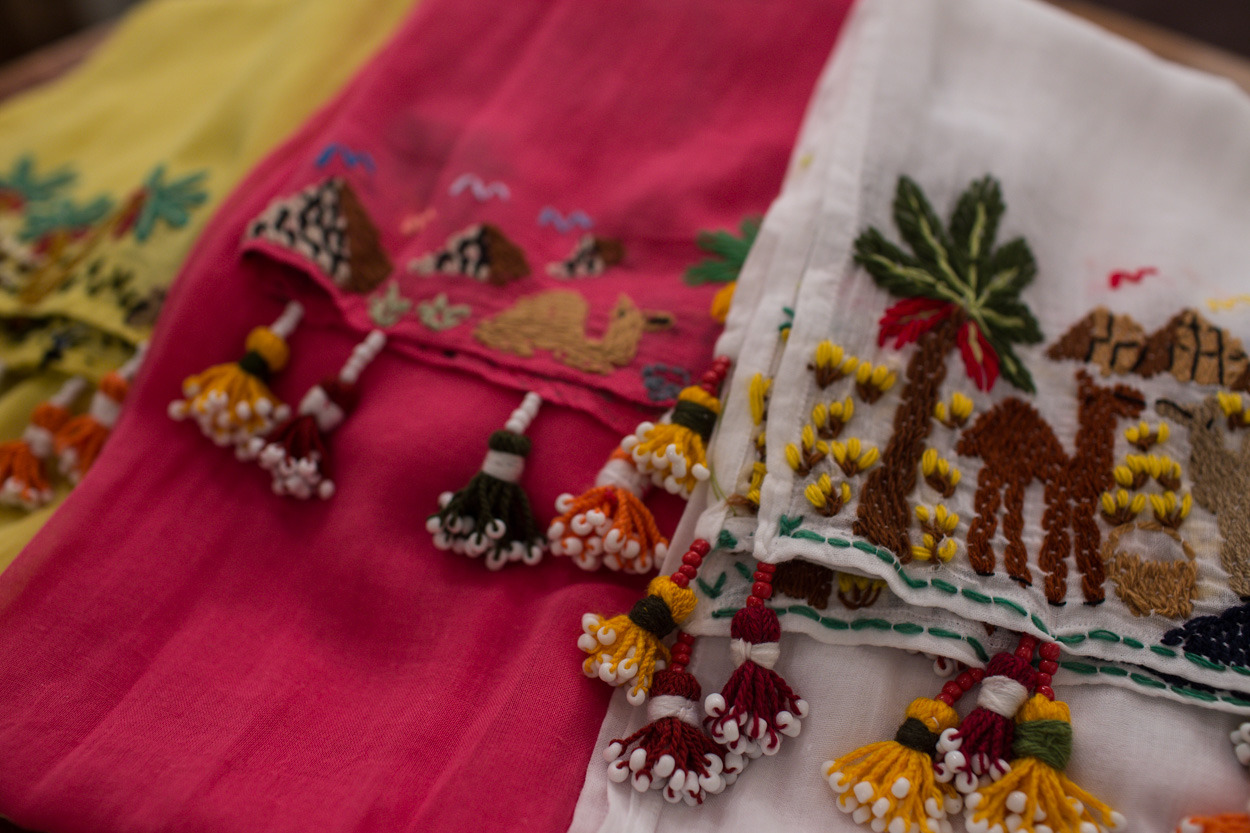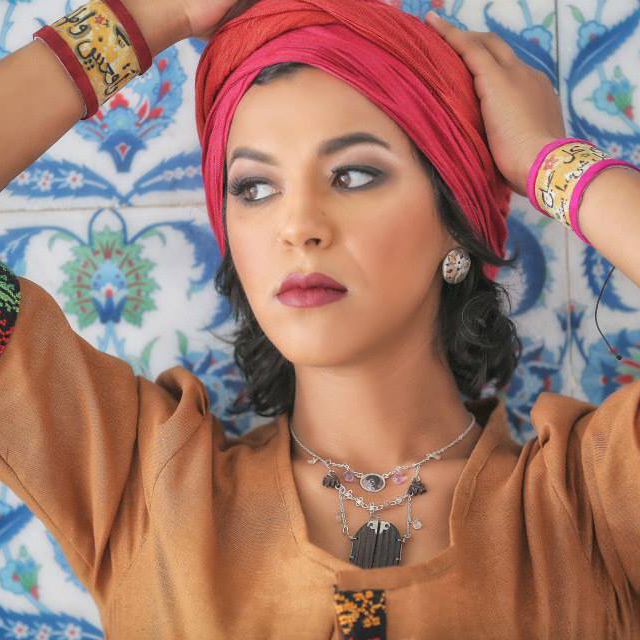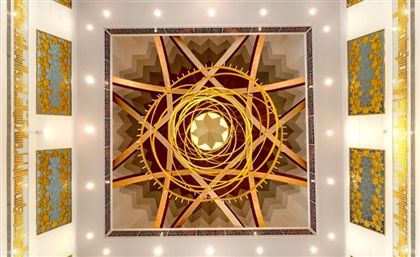Are Startups the Future of Egypt’s Craftsmen?
Valentina Primo delves into the ever-expanding world of design-based startups to find out how ancient crafts and contemporary art alike are surviving, thriving and modernising as she speaks to the businessmen and women monetising Egypt's imagination.

Tamara Altmann was still a little girl when her mother made the women of Siwa a promising offer: if they could reproduce the ancient art of embroidery their ancestors had treasured, she would regularly buy the unique pieces and commercialise them in Cairo. Today, Tamara and her mother, Nevine Altmann, are partners in a company that anticipated a growing trend amongst Egyptian entrepreneurs: setting up business to revive local artwork and crafts.
Created in 2011, the company offers 400 artisan women revenue for their work, which is sold at their exclusive store in Zamalek, as well as online. This year, the brand is opening their second store, in Cairo’s residential Maadi. “It’s a business built at everyone’s comfort,” explains Tamara, in charge of branding a startup her mother had established in 1988. “The women keep producing at their own pace, we don’t want to twist the tradition, so we'd only give them the fabric and colours and leave them to their own rhythm.”
The principle behind these startups stands in contrast to the market paradigm: rather than producing en masse for a standardised consumer, the edge their items offer is their uniqueness and, more significantly, the personal story behind each product.
Menna Khalil, a jewellery maker whose brand is making waves across Egypt, learned the art of silversmithing herself by submerging into Cairo’s mysterious Khan el Khalili market, in 2012. “My designs are different than anything available in the market because my collections are based on themes. Themes that can be part of nature, or history, or even the architecture of a country I travelled to,” she tells CairoScene.

Her last collection holds a fascinating story, one of nomadic encounters and talents united, and was conceived in dedication to a late professor that inspired her personal philosophy of life. “People tend to go commercial, but there are a few talented designers with a vision who work on the Egyptian identity and authenticity,” she says.
Like Khalil and Altmann’s, a striking number of startups are capitalising on local craft produce to both boost the domestic economy while preserving invaluable heritage. Such is the case of Turath, which not only focuses on preserving national heritage but also improving the livelihood of the weavers of Naqada, a small village in Upper Egypt where artisans still use the looms handed down since Pharaonic times.
“What artisans need is people buying more local products,” says Altmann, as she exemplifies the success of jeweller Azza Fahmy in turning artisan designs into high-end value products. “We need to give crafts a twist and turn them cool so that people can use them; there are products unique to Egypt, such as our cotton, or the stunning pottery from Fayoum,” she adds. “Today, online platforms are the best way to go, as they are simple ways to reach more consumers with a low cost."
Following traction gained by e-commerce platforms in the Middle East, platforms dedicated to handcrafts are steadily growing, as well as those who add artisan products to their catalogue online, such as Style Treasure. Founded in 2009, the online boutique added a ‘Homes & Gifts’ section in 2010 in order to include a multiplying number of young artisans. A year later, amid the revolutionary tumult Egypt was undergoing, the site tripled its traffic, averaging 20,000 monthly visitors.
More recently, Tombokka opened up a new space for designers and artists, adding value to their artwork by manufacturing products based on their designs. The platform, launched in 2013, works as a network for artists, whose designs are imprinted on products such as t-shirts, clocks, cushions, mugs and phone cases. Their manufacturing facility, located in Heliopolis, counts 50 employees and high technology printing machines ensure each order is delivered with the highest quality.
“We are educating the customer on the importance of crafts; we are not commercial but rather artistic based: we focus a lot on the artists doing the job and the story behind it, emphasising that the design matters. I want the customer to get involved with the designer and the artwork, not just the application,” says co-founder Mohamed Keshk.

Together with co-founder Nada Abdallah, and investors Khaled Shaffei and Ola Shaffei, Keshk kick started the company with 1 million LE initial investment, plus 300,000 LE pounds for the website development. “We started up a network of 30 artists whom we introduced to the project through different channels. After a while, more and more requests began to arrive,” he recalls.
“In printing exhibitions worldwide, it is more and more obvious how technology is serving the art field,” says Keshk, invoking his years of travel across exhibits around the globe. “In Egypt, there is a lack of technology and people tend to imitate designers for low-end firms, without having their own design teams. But there is a lot of people and a lot of potential, and every one of us can complete the missing link.”
Despite limitations linked to the lack of infrastructure in Egypt, the company sets out to create a trend in local production from scratch. “Technology available in Egypt is limited, especially when printing on fabric. This means that manufacturers usually send products abroad and it ends up being very expensive. But we have high technology in digital printing, so you don’t have limitations neither on quantity nor quality. For us, the sky is the limit, which is why we not only focus on t-shirts, but creating different applications,” he says.
Regionally, several other platforms are bringing artisanship to the international market, such as SALT, an Egyptian-Canadian social business that provides artisans in impoverished communities access to the global market by selling their products; and the Social Enterprise Project, an inventive Jordanian startup that is transforming Palestinian embroidery into a global sensation, exporting to all five continents across the world. Similarly to Altmann’s initiative, the startup employs women from the Jerash refugee camp in Jordan to produce high-quality jute bags and design clothes based on the ancient Palestinian tradition of embroidering.
“What we aim is to create a movement where people acknowledge what artists are doing; it’s nothing like going to Zara and getting a European design to wear: these are local artists who have a story to tell with each product they create,” says Keshk.
Main image by Christina Rizk.
- Previous Article Le Sahel :A One-Stop-Summer-Loving-Shop
- Next Article 10 Strictly Egyptian Moustaches That Will Inspire You This Movember























